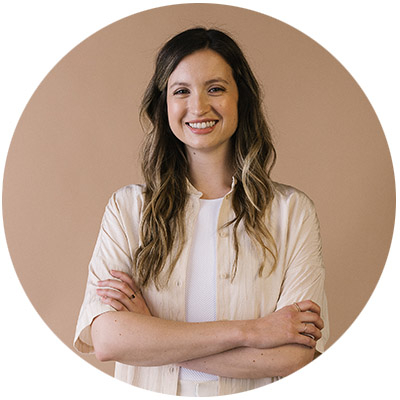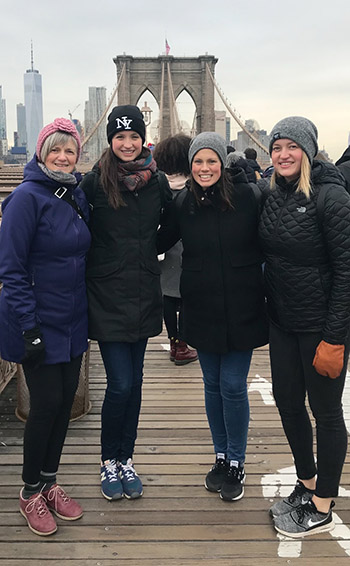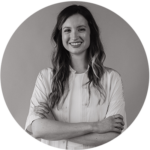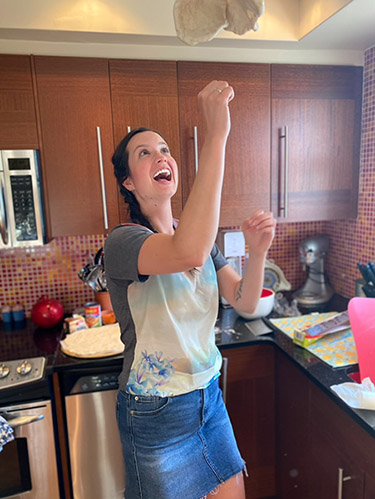
Navigating complex care with compassion
Meet Mary Farnand, Nurse Navigator at The Ottawa Hospital

Born into a family of nurses, it might seem like a career in nursing was the natural choice for Mary Farnand. But it took her a little while to find her way there. Today, Mary is a nurse navigator/ specialist at The Ottawa Hospital and can’t picture doing anything else. She spends her days working with patients, advocating for efficient and high-quality care. She smooths patients’ journeys from assessment to diagnosis and helps them navigate through difficulties in treatment, symptoms, their transition to survivorship, and supportive care.
Keep reading to learn the moment Mary decided to be a nurse — and what her hardest, and most rewarding, moments are.

Born into a family of nurses, it might seem like a career in nursing was the natural choice for Mary Farnand. But it took her a little while to find her way there. Today, Mary is a nurse navigator/ specialist at The Ottawa Hospital and can’t picture doing anything else. She spends her days working with patients, advocating for efficient and high-quality care. She smooths patients’ journeys from assessment to diagnosis and helps them navigate through difficulties in treatment, symptoms, their transition to survivorship, and supportive care.
Keep reading to learn the moment Mary decided to be a nurse — and what her hardest, and most rewarding, moments are.
Q: How did you wind up becoming a nurse?
A: It’s a little bit of a winding way. I think I was always headed towards nursing, even if I didn’t realize it.
I’m actually the youngest of five kids, and I come from a family of nurses; my mom is a nurse, my godmother is a nurse, my two older sisters are both nurses, and my sister-in-law is a nurse. I tell people nursing is the family business.
I sort of ran from it for a little while, though. At one point in my childhood, I wanted to be a fashion designer. I spent lots of time drawing and sewing.
Then, when I got to university, it was a really hard transition. One of the most overwhelming things was realizing there are so many things I could do. By my second year of university, I was thinking about a new thing I wanted to pursue every two weeks. I thought about law and journalism, and then I wanted to be a hairdresser. I was really confused about it all.
I finally got some really good advice from someone who said, “Listen, try not to think about what you want to do, think about what you’re naturally good at.”
I realized I’m a lot like my mom and sisters. I wanted to use both my intelligence and my desire to care for people in a tangible way. When I decided to go into nursing, I just slowly realized it was something I could do really well. And now, I love nursing.

Q: How were your first few years of nursing?
A: I’ve been a nurse for almost six years, and I started my career in internal medicine. I was really lucky because my sister was working when I graduated, so I got a job on her floor, where we worked together for a couple years at the General Campus. It was so awesome for me as a new grad because I could go to her with what I thought were my stupid questions. I felt super supported.
Internal medicine was an amazing place to start because there’s so much you experience — every specialty, every area of care. It was a massive learning curve, but I started to realize what areas I enjoyed and what types of patients I liked working with. I had a real love for palliative care, for being a support for patients and their families during a really hard time in their life.
I then found my way into a position in the Ages Cancer Assessment Clinic and have just loved it.
Q: You now work as a nurse navigator, what does that mean?
A: I didn’t know a lot about the nurse navigator role before working in the Ages Cancer Assessment Clinic. The role is fairly new within the nursing world, starting in the 2000s. The nurse navigator position came out of a need for a specialized role where patients could be helped through a complicated care process.
It allows patients to have a personalized approach to their care and gives them as much information and education as possible so they can make informed decisions about what comes next for their treatment. We act as a support for them and for their families, while also being a part of the care team and facilitating multidisciplinary care.
Q: What is most exciting about your job right now?
I’m now the Clinical Nurse Specialist for a new program within the Cancer Assessment Clinic for patients with cancers that have spread to the lining of the abdomen (the peritoneum). For the first time in Ottawa we’re providing HIPEC (heated intraperitoneal chemo) to patients. Previously, we had to send patients to Toronto or as far as Calgary to have access to this therapy, so this is going to make a big difference for patients and their families. Dr. Brittany Dingley is the lead for this new program and I’m so excited to be part of it.
Q: What is the hardest part of your job?
A: I definitely don’t want to sugar coat it; there are a lot of hard things. But I think probably the biggest challenge is what sticks with you and what comes home with you, being present for some really difficult moments in people’s lives. This is especially true working on the diagnostic side of things, with patients who are coming in and learning really awful diagnoses sometimes. But, that’s also one of the most important parts of my job — and one of the most fulfilling. It’s a privilege to be there for people during those incredibly hard experiences. It can just be heavy.
Q: What does working at The Ottawa Hospital mean to you?
A: I know from my experience at The Ottawa Hospital, and in general, the culture of teamwork is really amazing. It’s so important to recognize our multidisciplinary team and the support we try to give each other while working in as tough an environment as healthcare is.

It’s a privilege to be there for people during those incredibly hard experiences.
— Mary Farnand
Right now, especially working in cancer care, there is also so much research and advancement in care happening. I feel lucky to be at The Ottawa Hospital because it’s such a hub for research and learning. Even just within my last two years working in the Ages Cancer Assessment Clinic, and one of those years working within colorectal cancer specifically, there have been changes to the types of treatment plans we offer for patients. It’s amazing.

Q: What would we find you doing when you aren’t at the hospital?
A: I am really lucky. I get to spend lots of time with my friends and family; I have 10 nieces and nephews, who live close by. I love to host and I love to cook. One recipe I really love is for a Mexican chicken soup; it’s amazing comfort food, and you get to put on your own toppings. I love the summertime and being active and gardening outside, but I’m trying to commit myself to do more winter sports so I can better enjoy winter.
Listen Now:
Q: How did you wind up becoming a nurse?
A: It’s a little bit of a winding way. I think I was always headed towards nursing, even if I didn’t realize it.
I’m actually the youngest of five kids, and I come from a family of nurses; my mom is a nurse, my godmother is a nurse, my two older sisters are both nurses, and my sister-in-law is a nurse. I tell people nursing is the family business.
I sort of ran from it for a little while, though. At one point in my childhood, I wanted to be a fashion designer. I spent lots of time drawing and sewing.
Then, when I got to university, it was a really hard transition. One of the most overwhelming things was realizing there are so many things I could do. By my second year of university, I was thinking about a new thing I wanted to pursue every two weeks. I thought about law and journalism, and then I wanted to be a hairdresser. I was really confused about it all.
I finally got some really good advice from someone who said, “Listen, try not to think about what you want to do, think about what you’re naturally good at.”
I realized I’m a lot like my mom and sisters. I wanted to use both my intelligence and my desire to care for people in a tangible way. When I decided to go into nursing, I just slowly realized it was something I could do really well. And now, I love nursing.

Q: How were your first few years of nursing?
A: I’ve been a nurse for almost six years, and I started my career in internal medicine. I was really lucky because my sister was working when I graduated, so I got a job on her floor, where we worked together for a couple years at the General Campus. It was so awesome for me as a new grad because I could go to her with what I thought were my stupid questions. I felt super supported.
Internal medicine was an amazing place to start because there’s so much you experience — every specialty, every area of care. It was a massive learning curve, but I started to realize what areas I enjoyed and what types of patients I liked working with. I had a real love for palliative care, for being a support for patients and their families during a really hard time in their life.
I then found my way into a position in the Ages Cancer Assessment Clinic and have just loved it.
Q: You now work as a nurse navigator, what does that mean?
A: I didn’t know a lot about the nurse navigator role before working in the Ages Cancer Assessment Clinic. The role is fairly new within the nursing world, starting in the 2000s. The nurse navigator position came out of a need for a specialized role where patients could be helped through a complicated care process.
It allows patients to have a personalized approach to their care and gives them as much information and education as possible so they can make informed decisions about what comes next for their treatment. We act as a support for them and for their families, while also being a part of the care team and facilitating multidisciplinary care.
Q: What is the hardest part of your job?
A: I definitely don’t want to sugar coat it; there are a lot of hard things. But I think probably the biggest challenge is what sticks with you and what comes home with you, being present for some really difficult moments in people’s lives. This is especially true working on the diagnostic side of things, with patients who are coming in and learning really awful diagnoses sometimes. But, that’s also one of the most important parts of my job — and one of the most fulfilling. It’s a privilege to be there for people during those incredibly hard experiences. It can just be heavy.
Q: What does working at The Ottawa Hospital mean to you?
A: I know from my experience at The Ottawa Hospital, and in general, the culture of teamwork is really amazing. It’s so important to recognize our multidisciplinary team and the support we try to give each other while working in as tough an environment as healthcare is.

It’s a privilege to be there for people during those incredibly hard experiences.
— Mary Farnand
Right now, especially working in cancer care, there is also so much research and advancement in care happening. I feel lucky to be at The Ottawa Hospital because it’s such a hub for research and learning. Even just within my last two years working in the Ages Cancer Assessment Clinic, and one of those years working within colorectal cancer specifically, there have been changes to the types of treatment plans we offer for patients. It’s amazing.

Q: What would we find you doing when you aren’t at the hospital?
A: I am really lucky. I get to spend lots of time with my friends and family; I have 10 nieces and nephews, who live close by. I love to host and I love to cook. One recipe I really love is for a Mexican chicken soup; it’s amazing comfort food, and you get to put on your own toppings. I love the summertime and being active and gardening outside, but I’m trying to commit myself to do more winter sports so I can better enjoy winter.
Q: How did you wind up becoming a nurse?
A: It’s a little bit of a winding way. I think I was always headed towards nursing, even if I didn’t realize it.
I’m actually the youngest of five kids, and I come from a family of nurses; my mom is a nurse, my godmother is a nurse, my two older sisters are both nurses, and my sister-in-law is a nurse. I tell people nursing is the family business.
I sort of ran from it for a little while, though. At one point in my childhood, I wanted to be a fashion designer. I spent lots of time drawing and sewing.
Then, when I got to university, it was a really hard transition. One of the most overwhelming things was realizing there are so many things I could do. By my second year of university, I was thinking about a new thing I wanted to pursue every two weeks. I thought about law and journalism, and then I wanted to be a hairdresser. I was really confused about it all.

I finally got some really good advice from someone who said, “Listen, try not to think about what you want to do, think about what you’re naturally good at.”
I realized I’m a lot like my mom and sisters. I wanted to use both my intelligence and my desire to care for people in a tangible way. When I decided to go into nursing, I just slowly realized it was something I could do really well. And now, I love nursing.
Q: How were your first few years of nursing?
A: I’ve been a nurse for almost six years, and I started my career in internal medicine. I was really lucky because my sister was working when I graduated, so I got a job on her floor, where we worked together for a couple years at the General Campus. It was so awesome for me as a new grad because I could go to her with what I thought were my stupid questions. I felt super supported.
Internal medicine was an amazing place to start because there’s so much you experience — every specialty, every area of care. It was a massive learning curve, but I started to realize what areas I enjoyed and what types of patients I liked working with. I had a real love for palliative care, for being a support for patients and their families during a really hard time in their life.
I then found my way into a position in the Ages Cancer Assessment Clinic and have just loved it.
Q: You now work as a nurse navigator, what does that mean?
A: I didn’t know a lot about the nurse navigator role before working in the Ages Cancer Assessment Clinic. The role is fairly new within the nursing world, starting in the 2000s. The nurse navigator position came out of a need for a specialized role where patients could be helped through a complicated care process.
It allows patients to have a personalized approach to their care and gives them as much information and education as possible so they can make informed decisions about what comes next for their treatment. We act as a support for them and for their families, while also being a part of the care team and facilitating multidisciplinary care.
Q: What is the hardest part of your job?
A: I definitely don’t want to sugar coat it; there are a lot of hard things. But I think probably the biggest challenge is what sticks with you and what comes home with you, being present for some really difficult moments in people’s lives. This is especially true working on the diagnostic side of things, with patients who are coming in and learning really awful diagnoses sometimes. But, that’s also one of the most important parts of my job — and one of the most fulfilling. It’s a privilege to be there for people during those incredibly hard experiences. It can just be heavy.

It’s a privilege to be there for people during those incredibly hard experiences.
— Mary Farnand
Q: What does working at The Ottawa Hospital mean to you?
A: I know from my experience at The Ottawa Hospital, and in general, the culture of teamwork is really amazing. It’s so important to recognize our multidisciplinary team and the support we try to give each other while working in as tough an environment as healthcare is.
Right now, especially working in cancer care, there is also so much research and advancement in care happening. I feel lucky to be at The Ottawa Hospital because it’s such a hub for research and learning. Even just within my last two years working in the Ages Cancer Assessment Clinic, and one of those years working within colorectal cancer specifically, there have been changes to the types of treatment plans we offer for patients. It’s amazing.

Q: What would we find you doing when you aren’t at the hospital?
A: I am really lucky. I get to spend lots of time with my friends and family; I have 10 nieces and nephews, who live close by. I love to host and I love to cook. One recipe I really love is for a Mexican chicken soup; it’s amazing comfort food, and you get to put on your own toppings. I love the summertime and being active and gardening outside, but I’m trying to commit myself to do more winter sports so I can better enjoy winter.

